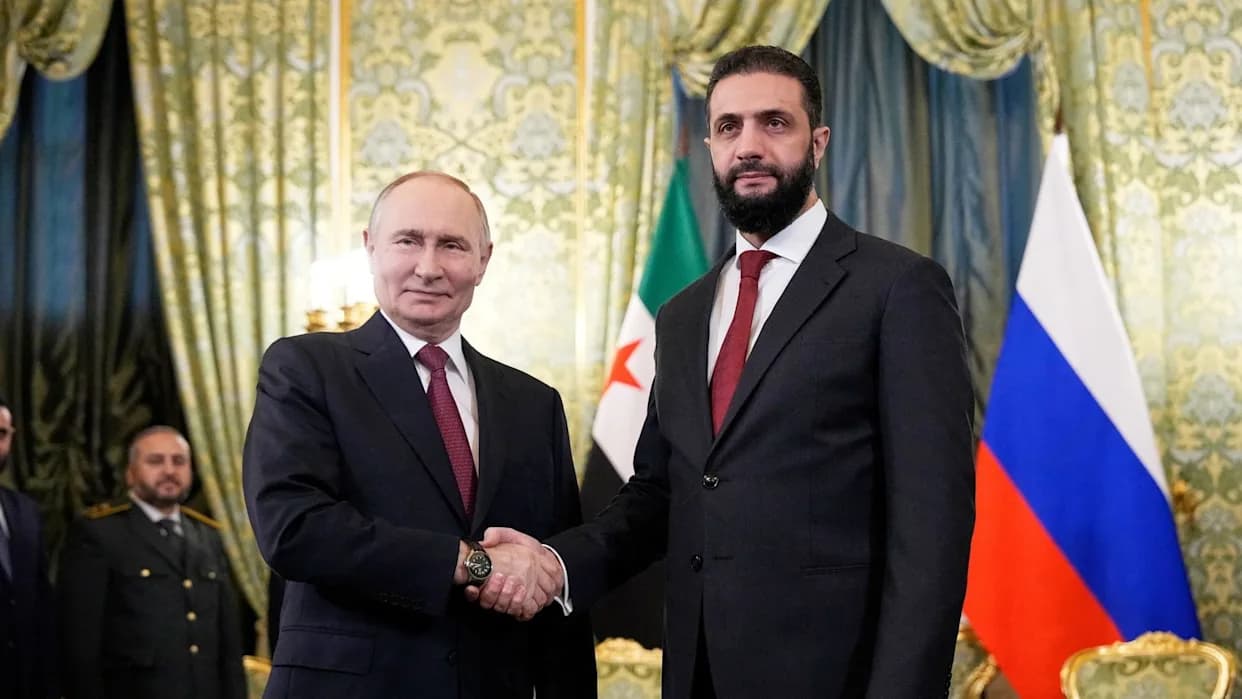We're loading the full news article for you. This includes the article content, images, author information, and related articles.
Syria's interim President Ahmed al-Sharaa held his first talks with Russian President Vladimir Putin in Moscow, signalling a pragmatic shift in relations after al-Sharaa's forces ousted Russia's long-time ally Bashar al-Assad ten months ago.

In a significant diplomatic development, Syrian interim President Ahmed al-Sharaa met with Russian President Vladimir Putin in Moscow on Wednesday, October 15, 2025, marking their first encounter since al-Sharaa's forces overthrew the Russian-backed Bashar al-Assad regime ten months prior. The meeting, held at the Kremlin, highlights a pragmatic pivot for both nations, as Russia seeks to safeguard its strategic military presence in Syria and forge new ties with the transitional government.
President Putin acknowledged the "special relationship" between Russia and Syria, a sentiment echoed by al-Sharaa, who indicated his government's willingness to honour existing agreements regarding Russia's military bases in Syria. This commitment is crucial for Moscow, which maintains two key military facilities in Syria: the Hmeimim airbase near Latakia and a naval base in Tartus. These bases have been operational since Russia's military intervention in the Syrian civil war in 2015.
The meeting is particularly notable given the historical animosity; Putin had previously deployed brutal military force to support Bashar al-Assad, while al-Sharaa, a former jihadist, led the rebel offensive that ultimately forced Assad from power. Assad and his family were granted asylum in Moscow following his flight from Damascus in December 2024.
During the talks, al-Sharaa was expected to formally request the extradition of Assad for trial over alleged crimes against Syrians. However, Russian Foreign Minister Sergei Lavrov had previously stated that Moscow granted asylum to Assad and his family for "purely humanitarian reasons," and analysts suggest Russia is unlikely to extradite him.
Ahmed al-Sharaa, who assumed the presidency of Syria in January 2025, has focused on consolidating power, rebuilding state institutions, and restoring Syria's international relations. His government, formed on March 29, 2025, has engaged with various international actors, including the United States and European and Gulf leaders, to secure sanctions relief and diversify alliances.
The Syrian civil war, which began in March 2011 with protests against Bashar al-Assad's regime, escalated into a full-scale conflict, leading to widespread devastation and displacement. Russia's intervention in 2015 significantly bolstered Assad's forces, but the regime ultimately collapsed in December 2024.
While Kenya does not have direct diplomatic relations with the transitional Syrian government, its foreign policy in the Middle East is characterised by non-alignment and a pragmatic approach to foster strong ties with both Arab-Islamic states and Israel. Kenya's engagement is often driven by economic and security interests, including counter-terrorism cooperation. Nairobi has historically supported African Union resolutions on Middle East issues and has, at times, faced scrutiny for its diplomatic support to Israel.
The exact scale of Russia's future military presence in Syria remains unclear, despite al-Sharaa's assurances. The new Syrian government is also reportedly seeking Russia's assistance in rebuilding the Syrian army. The international community continues to observe al-Sharaa's government cautiously, particularly regarding its commitment to protecting religious minorities and its ability to unify and democratise a fractured Syria.
The meeting between al-Sharaa and Putin signals a complex and evolving geopolitical landscape in the Middle East. Future developments will likely hinge on the ongoing negotiations between Syria and Russia, the international community's engagement with the transitional Syrian government, and the broader regional dynamics.
Keep the conversation in one place—threads here stay linked to the story and in the forums.
Sign in to start a discussion
Start a conversation about this story and keep it linked here.
Other hot threads
E-sports and Gaming Community in Kenya
Active 9 months ago
The Role of Technology in Modern Agriculture (AgriTech)
Active 9 months ago
Popular Recreational Activities Across Counties
Active 9 months ago
Investing in Youth Sports Development Programs
Active 9 months ago